|
|
|
Sort Order |
|
|
|
Items / Page
|
|
|
|
|
|
|
| Srl | Item |
| 1 |
ID:
051448
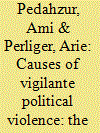

|
|
|
| 2 |
ID:
104077


|
|
|
|
|
| Publication |
2011.
|
| Summary/Abstract |
The Israeli reservists played a major role in the protest movements that developed after the 1973 War and the First Lebanon War (1982-85). In other cases, debates about moral and political issues within the Israeli political system included petitions and rallies conducted by groups of reservists. How can scholars explain the special standing of the Israeli reservists within Israeli society? Why, during the 1970s and the 1980s, did the protests of the reservists lead to significant changes in the Israeli political and social arena, while this was not the case in the aftermath of the Second Lebanon War? The article explores these dilemmas by presenting different facets of the Israeli reserve army and its role in civil-military relations in Israel. The rationale for the establishment of the reserve army in Israel is discussed and is followed by an analysis of the changes the reserve forces have gone through since the establishment of the state.
|
|
|
|
|
|
|
|
|
|
|
|
|
|
|
|
| 3 |
ID:
121901
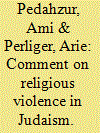

|
|
|
|
|
| Publication |
2013.
|
| Summary/Abstract |
Gideon Aran and Ron Hassner, both distinguished scholars of religious violence, offer a rich discussion of violence in Judaism. They guide the reader on a tour from the past to the present, making stops at crucial crossroads and offering a sophisticated discussion in which they draw lines between biblical texts, culture, and contemporary political events. The authors' backgrounds (Aran is an anthropologist and Hassner is a political scientist) turn the text into a compelling exploration of the phenomenon and a real tour de force.
|
|
|
|
|
|
|
|
|
|
|
|
|
|
|
|
| 4 |
ID:
188065


|
|
|
|
|
| Summary/Abstract |
Increasing levels of extreme weather patterns and environmental deterioration pose pertinent threats to the availability of essential resources, such as food and water. Past research has found a positive association between climate change and the likelihood of internal conflicts, especially in developing countries. We argue that intensifying climate events can lead to an increase in the spread and intensity of both left and right-wing ideologically motivated violence in developed countries as well, specifically the United States. We also focus on how regional environmental characteristics might be correlated to the geographical distribution of domestic political violence. Our findings suggest that while both far-right and environmental violence are more prevalent during warmer seasons and extreme warming weather events, such as heat waves, political and demographic factors also need to be considered. We also found a strong linkage between man-made ecological damage, as opposed to natural disasters, and the prevalence of eco-violence incidents, especially in states that have a progressive-liberal political culture and high levels of ecological exploitation. We conclude with a brief discussion of findings and suggestions for future research.
|
|
|
|
|
|
|
|
|
|
|
|
|
|
|
|
| 5 |
ID:
146195
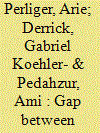

|
|
|
|
|
| Summary/Abstract |
For decades, practitioners and academics sought to identify a common terrorist “profile.” However, the consensus in both the policy realm and academia suggests that, so far, these efforts produced only modest insights. This research note identifies and addresses a major impediment to previous studies of terrorist profiles: conceptualization. We argue that ambiguities in the definition of the term terrorist lead to an inconsistent and aggregated operationalization in the existing literature. Previous studies attempt to identify the factors correlated with a willingness to commit violence rather than the factors that correlate with the willingness to join an organization that commits violence. We test our claim by disaggregating the roles and responsibilities of members of various Islamist terrorist networks. We provide initial evidence that disaggregation presents a promising first step toward identifying specific profiles for different types of terrorists.
|
|
|
|
|
|
|
|
|
|
|
|
|
|
|
|
| 6 |
ID:
116182
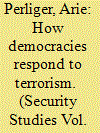

|
|
|
|
|
| Publication |
2012.
|
| Summary/Abstract |
While the academic study of counterterrorism has gained momentum in recent years, it still suffers from major theoretical weaknesses. One of the most prominent shortcomings is an absence of theories that can effectively explain the factors that shape the counterterrorism policies of democratic regimes. The present study attempts to fill this theoretical void in two ways. First, it proposes an analytical framework for a classification of counterterrorism policies. Second, it presents a theoretical framework that strives to uncover the factors that have influenced the struggle against domestic terrorism in democratic regimes. The analyses, which have used a unique and comprehensive dataset that documents counterterrorism policies in eighty-three democracies, show that the robustness of the regime's democratic foundations as well as the symbolic effect of terrorism are major forces in shaping the democratic response to it, while the direct impact of terrorism is less influential than assumed in the literature.
|
|
|
|
|
|
|
|
|
|
|
|
|
|
|
|
| 7 |
ID:
193072


|
|
|
|
|
| Summary/Abstract |
The current study aims to assess the emotional processes that foster support for political violence. A survey of 1202 respondents was used to identify the association between emotional traits, support for extremist groups, and willingness to engage in political violence. Additionally, we tested how attitudinal traits’ interaction with emotional factors may impact radicalization. Our findings indicate that aspects of anger and anxiety, as well as emotional triggers related to social interactions, are associated with increased support for political violence and extremism. Moreover, we identified important pathways in which attitudinal and emotional traits interact to facilitate radicalization further.
|
|
|
|
|
|
|
|
|
|
|
|
|
|
|
|
| 8 |
ID:
188009


|
|
|
|
|
| Summary/Abstract |
In recent years, terrorist groups intensified their cooperation with criminal entities or their independent engagement in criminal activities. But why and how, exactly, is cooperation with criminal actors beneficial for terrorist groups? And under which political and economic conditions are criminal and terrorist entities more inclined to cooperate or coordinate their operations? Despite the growing interest of academics and practitioners in the nexus of crime and terrorism, we are still unable to answer such questions authoritatively, and, in general, we are lacking in our understanding of the operational characteristics of these connections. The current study utilizes a global dataset of cases of cooperation between terrorist and criminal groups in order to try and answer some of these questions. Our findings indicate that both organizational and environmental factors can predict the likelihood of collaboration. More specifically, group structure, lifespan, ethnic/religious compatibility, geographical proximity, and the existence of criminal infrastructure are all associated with the tendency of criminal and terrorist groups to cooperate. Lastly, corporate and established terrorist groups are more inclined to engage in multiple low-end cooperation rather than high end.
|
|
|
|
|
|
|
|
|
|
|
|
|
|
|
|
| 9 |
ID:
137545
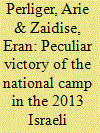

|
|
|
|
|
| Summary/Abstract |
This article argues that attempts to characterize the outcome of the elections to the 19th Knesset as a defeat of the Israeli right are misleading. By using a three-dimensional analysis of the ideological makeup of the Knesset, based on the ideological manifestos of the parties, the socio-demographic profiles of Knesset members and analyses of election results utilizing electoral data and socio-demographic data obtained from Israel's Central Bureau of Statistics (CBS), the article claims that the 19th Knesset is no less right-leaning than its predecessor. Hence, contrary to some commentators in both the media and academia, the 2013 elections represent a true landmark for the settlers. For the first time since the movement appeared in the 1970s, it managed to obtain a solid base in the Knesset.
|
|
|
|
|
|
|
|
|
|
|
|
|
|
|
|
| 10 |
ID:
178531
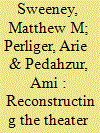

|
|
|
|
|
| Summary/Abstract |
The study explores the nexus of violence and mass media, and the ability of terrorists to enhance their influence and resources via effective marketing of their actions. We utilized a dataset of 242 IS propaganda videos in order to examine how the Islamic State employed visual propaganda to enhance the effectiveness of a low-cost, high-impact terrorist campaign, by reconstructing the theater of terror. Our findings illustrate the positive relationship between the IS territorial control and the quality of its media production, thus the IS uses propaganda to develop a relatively low-cost avenue to global media attention. Prior acts of terrorism were risky, high cost, and required news media to cover the incidents. For IS, a steady stream of battle imagery allowed it to develop highly efficient low-cost propaganda. Additionally, we identified associations between the video’s thematic components, including between level of depicted violence and the tendency of the videos to be critical or to include religious symbols, as well as their production value. It reflects the importance that terrorist groups place in maximizing the symbolic impact of their violent videos which intend to depict their military capabilities, and capacity to retaliate against their enemies.
|
|
|
|
|
|
|
|
|
|
|
|
|
|
|
|
| 11 |
ID:
154977


|
|
|
|
|
| Summary/Abstract |
Political assassinations can dramatically impact political and social dynamics, especially in times of violent political conflicts or electoral competition. The current study explores if and how specific social and political events facilitate the occurrence of political assassinations. After an examination of the logic of political assassinations, a theoretical framework is presented, which explains the role of civil wars and electoral processes as facilitators of different types of political assassinations. The theory is tested via a dataset of political assassinations worldwide between the years 1946–2013. The findings confirm that different sets of structural and contextual factors facilitate assassinations against heads of state, legislators, and leaders of opposition movements/parties. In addition, the findings illustrate the tendency of elections, especially in nonliberal settings and in polarized societies, to facilitate political assassinations rather than to calm the political environment. In contrast, civil wars have a more limited impact on the probability of assassinations, and their intensity and endurance mainly enhance the risk of assassinations of legislators.
|
|
|
|
|
|
|
|
|
|
|
|
|
|
|
|
| 12 |
ID:
102066
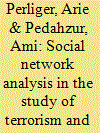

|
|
|
| 13 |
ID:
188078
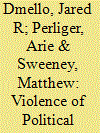

|
|
|
|
|
| Summary/Abstract |
Ideological violence, according to previous research, tends to spike following what may be perceived as an electoral success of an ideologically-affiliated political camp. Despite a growing number of examples across the globe, the extent to which ideological success in electoral processes impacts terrorism within constituencies remains under-researched. This exploratory analysis seeks to examine how majority-minority outcomes in the electoral process influence terrorism in democratic states. This study employs a longitudinal case study approach for the Republic of India, using publicly available data from the Census of India and open-sourced data on terrorist activity. We find that economic stress most strongly impacts the likelihood that supporters of the political majority will engage in terrorist activity, followed by social cohesion, measured through religious homogeneity.
|
|
|
|
|
|
|
|
|
|
|
|
|
|
|
|
|
|
|
|
|